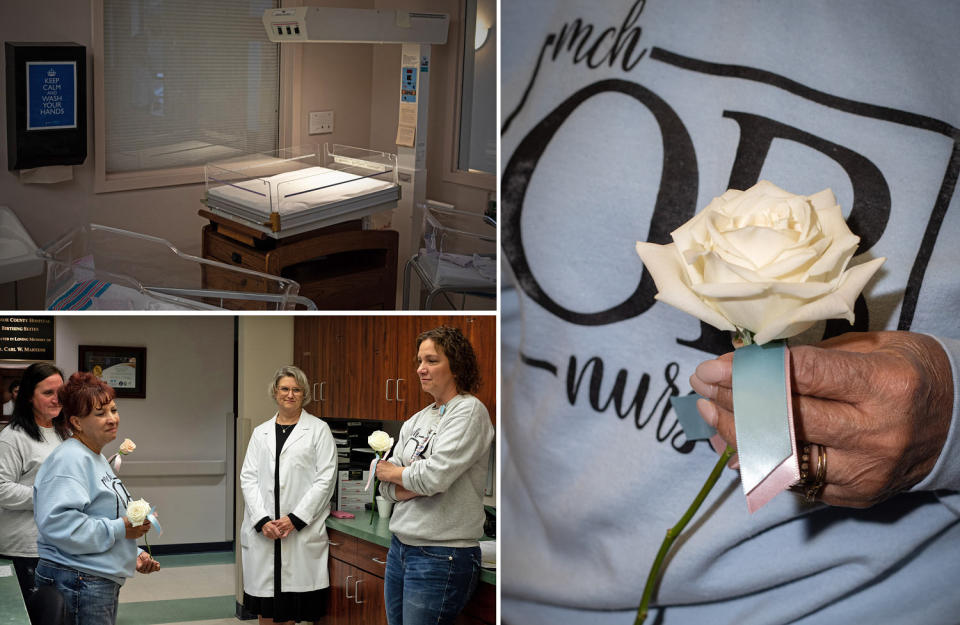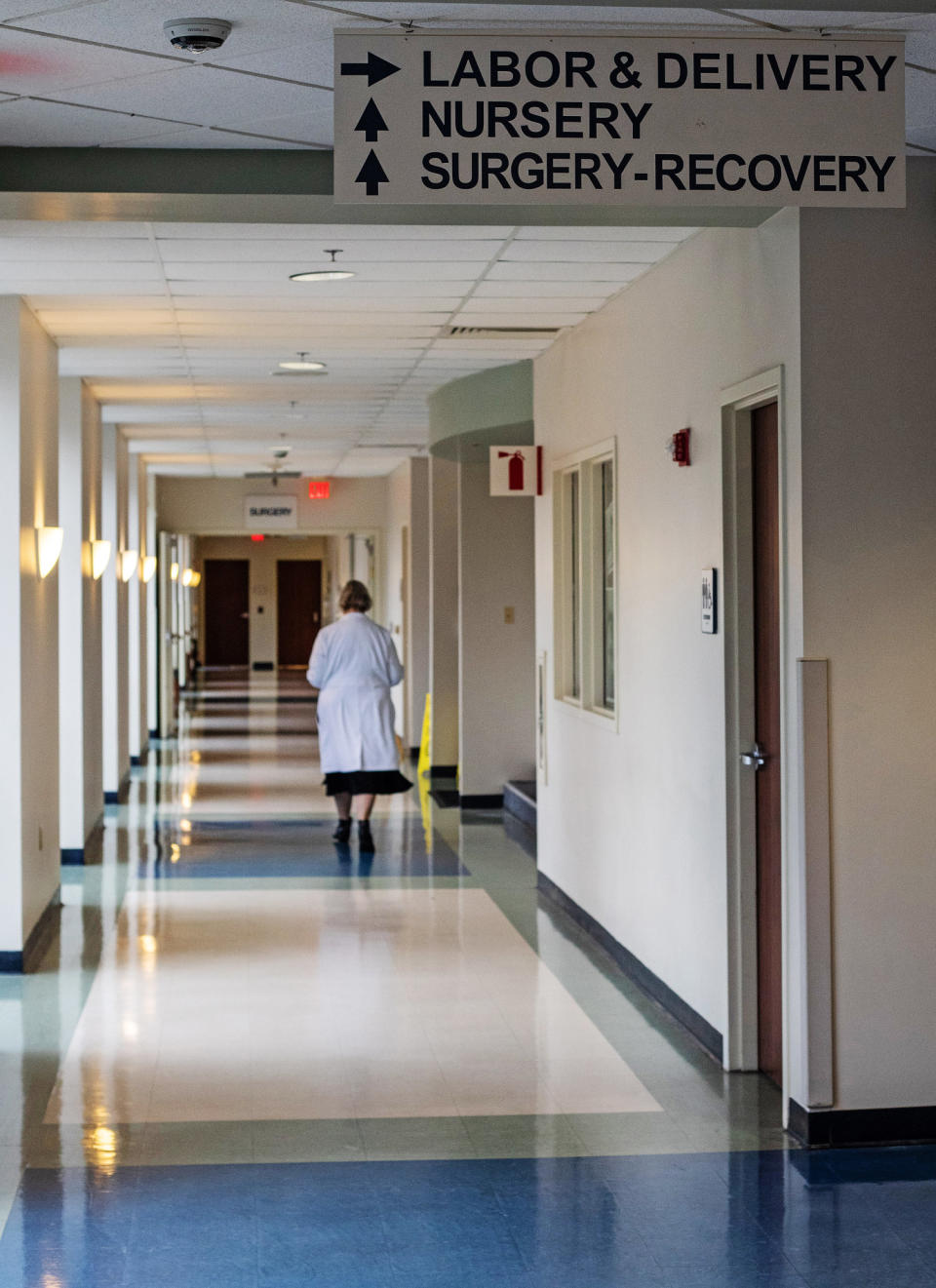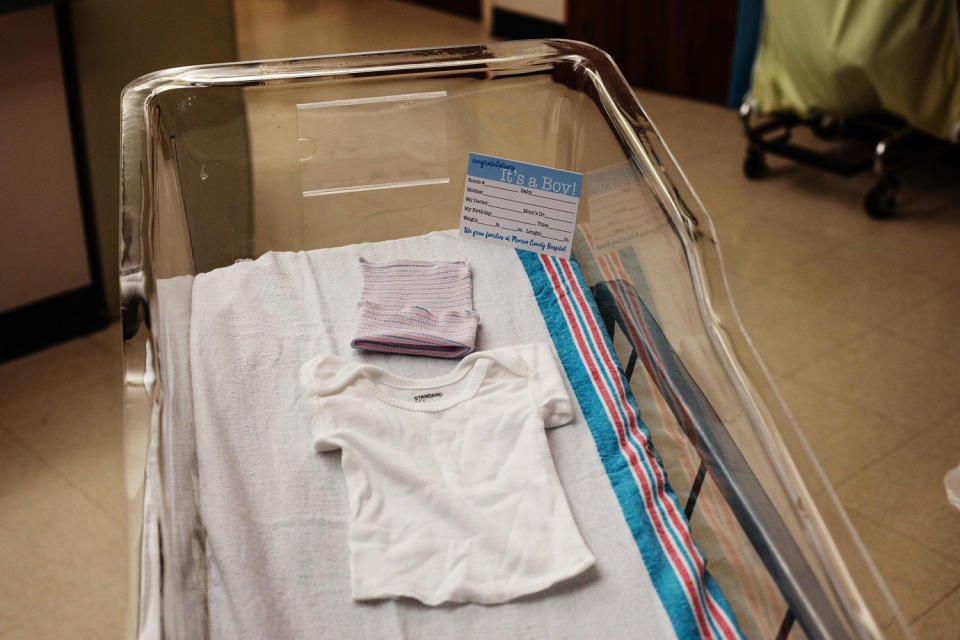With tears and a lullaby, a rural Alabama hospital stops delivering babies
At 6:58 a.m. Thursday, Dr. Angela Adams Powell addressed the nurses at the south Alabama hospital where she had delivered babies for more than 25 years.
“I was afraid I might not be able to speak,” she said, her voice breaking, “and I might not.”
In two minutes, the labor and delivery department at Monroe County Hospital would shutter, leaving the community without a birthing hospital. In two minutes, pregnant women in a county where 22% of residents live below the poverty line would be forced to travel 35 to 103 miles for the next nearest option.
The last-minute reprieve Powell had hoped for wasn’t coming.
She tried to keep her voice steady as those gathered around her dabbed their eyes.
“That decision was not ours,” she said. “But for the women and children that we’ve served, we’ve done our best.”
Monroe County is the latest in a growing list of hospitals in Alabama where labor and delivery teams have had to say goodbye recently. Last month, maternity units closed in Birmingham and Shelby County.
In rural areas, such as Monroe County, one closing might leave an entire community without labor and delivery services. More than a third of Alabama’s counties are maternity care deserts, lacking hospitals with obstetrics care, birth centers or obstetrics providers, according to a report from the March of Dimes, a nonprofit organization.
Liz Kirby, Monroe County Hospital's CEO, said a physician shortage was behind the closing. After the Supreme Court decision overturning Roe v. Wade, some hospitals in states with strict abortion bans have warned that it could become harder to recruit OB-GYNs, though Kirby said she wasn't aware of that as a factor in this case. Residency applications for the specialty have also dropped more in states with abortion bans than nationally.
Powell thought administrators could have done more to address workplace concerns that she believed hurt recruiting and retention.
Kirby said the hospital has worked with three recruiters to try to staff the labor and delivery department.
"No one wanted this," she said. "It certainly was not an easy decision."
Alabama is in the throes of a maternal and infant health crisis, with some of the highest rates of infant and maternal mortality in the country. Physicians say those losses should be answered with more access to care — not less.
State Rep. Thomas Jackson, a Democrat whose district includes Monroe County, said taking away obstetrics care leaves the community “wounded.”
“How are we going to manage?” he said.

Powell understands how the stakes can rise with each mile a pregnant woman must travel for medical care. She still remembers the patient from about 16 years ago who came through the hospital’s double doors with blood dripping down the side of her wheelchair. The woman had suffered a placental abruption and had to be rushed into an emergency cesarean section. Powell thought the baby wouldn’t make it, but both mother and newborn survived.
“That situation — while it is infrequent — it’s not rare,” Powell said. “Driving a distance of 40 miles, 90 miles to try to get that care puts both the mother and baby’s life at risk.”
Powell grew up in Gilbertown, Alabama, in a county that is considered a maternity care desert. Her dad was an entrepreneur, and her mother ran an auto shop where Powell sold car parts, but from a young age, she knew she wanted to be a doctor.
After medical school, in 1997, she moved with her husband and young son to Monroeville. She began practicing as a family medicine physician at Monroe County Hospital, and she also opened a private clinic. She and her husband soon had a daughter, as well.
Some of her patients were in cribs, while others were eligible for Social Security. Her obstetrics training meant that in addition to offering primary care, she could see patients throughout their pregnancies and deliver their babies.

Monroeville, a city of about 6,000, is known in literary lore for one of its most famous natives, Harper Lee, the author of “To Kill a Mockingbird.”
Vestiges of the unequal Alabama society that Lee wrote about in 1960 still echo in national racial and socioeconomic disparities. Black children are 2.4 times more likely to die in infancy than white newborns. In adulthood, Black Americans have one of the country’s lowest life expectancies.
This fall, the recent wave of maternity unit closings across the U.S. arrived at Monroe County Hospital.
Powell was in the operating room one evening in late September when she saw a missed call from the hospital’s CEO. The head of surgery and an anesthetist had missed calls, too. Powell knew something was wrong.
As she walked to her car, she returned the call. She listened as Kirby told her the board had decided to end labor and delivery services.
Memories of the emergencies her team had worked on flashed through Powell’s mind.
She couldn’t speak. When she finally did, she asked for the unit’s last day.
She turned around and walked back to her office and began pulling up her patients’ charts so she could call them. She would start with the ones with due dates after Nov. 15. There were 83.

Over the past few weeks, Powell held out hope that the hospital would reconsider, or maybe someone outside of it — like the state — might come in with a last-minute rescue.
She also started having serious conversations with her patients. If they go into early labor and can still feel the baby moving, she told them, they should probably set out for the nearest delivery hospital in another county. But if they are hemorrhaging, they need to get to a local emergency room quickly — Monroe County Hospital will still deliver babies in urgent circumstances.
There wasn’t a day when she didn’t have an “ugly cry,” she said.
In the hospital’s waning days, before the start of each C-section, a nurse reminded her colleagues that it could be their last one together.
“Stop,” Powell told her. “You’re going to make my glasses fog up.”
The labor and delivery team was close-knit, and it had developed rituals. After a birth, they played Brahms’ “Lullaby” over the hospital’s loudspeaker.
On Monday, Powell discharged the unit’s last newborn. Like she’d done before, she went over the ins and outs of having an infant at home — like the sounds that parents should be concerned about.
Like she’d done before, she reassured the mom, “The road that takes you home brings you back.”
But it won’t bring many more expectant mothers. And Powell is wondering about whether to seek work elsewhere so she can keep delivering babies.

On Wednesday, Powell tried to encourage one of her patients, Stacey Fountain, 38, to decide where she’d go to have her baby. Although Powell is still providing prenatal care at her clinic, patients will need to deliver elsewhere.
Fountain, who is 25 weeks pregnant, hadn’t been able to bring herself to start thinking about it.
“It ain’t hit me yet,” she said of the labor and delivery unit’s closure.
Her February due date means she has some time, but she’s still overwhelmed.
“You’re putting your life in other people’s hands you don’t know,” she said.
The next day, Powell walked into the hospital to say goodbye.
After she tearfully addressed the team, one of her co-workers pulled up Brahms’ “Lullaby” on her phone. A nurse in navy scrubs picked up the receiver to the hospital’s intercom.
“Attention Monroe County Hospital, at 7 a.m. this morning, we have officially shut the doors to the OB department,” the nurse said, before thanking the moms who had entrusted them with their care.
“This is labor and delivery signing out for the final time.”
Powell held her hands up to her face as the familiar chimes played.
This article was originally published on NBCNews.com

